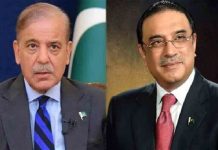-Court takes surety from CM not to dissolve Provincial Assembly
-PTI says Assemblies have to be dissolved sooner or later
-PA passes Resolution against Governor’s ‘illegal’ move to dismiss Chief Minister
From Abid Usman
LAHORE: The Lahore High Court (LHC) on Friday reinstated PML-Q leader Chaudhry Parvez Elahi as the Punjab chief minister after he submitted an undertaking assuring the court that he would not dissolve the provincial assembly until the next hearing scheduled for January 11, 2023.
The court issued the directives as a five-member bench took up Elahi’s plea challenging Punjab Governor Balighur Rehman’s orders to de-notify him as the provincial chief executive.
The written order said the governor’s Dec 19 and Dec 22 orders were held in abeyance until the next hearing and the PML-Q leader as well as the cabinet were restored “as an interim measure”.
“However, this order will not preclude the petitioner from taking vote of confidence on his own accord,” the order said.
On Thursday night, the Punjab governor sprang into action and denotified Elahi as chief minister of the largest province in a bid to forestall ousted premier Imran Khan’s plan to dissolve the Punjab Assembly (PA).
In his order dated Dec 22, the governor said that since the chief minister had refrained from taking a vote of confidence at the appo¬i¬nted day and time, he ceased to hold the office. Rehman, however, asked Elahi to continue working as chief minister until his successor takes charge.
Subsequently, Elahi approached the court earlier in the day, saying the move was “unconstitutional, unlawful and of no legal effect”. The hearing was put off for an hour after the court asked Elahi’s counsel, Barrister Ali Zafar, to seek an assurance from his client with regards to not dissolving the assembly.
When the hearing resumed Elahi, through his counsel, submitted an undertaking wherein he said he would not dissolve the provincial assembly until the next hearing.
“If me and my cabinet are reinstated, then I will not send the assembly dissolution summary to the governor till the next hearing,” the undertaking, which was read aloud by Zafar in the courtroom, said.
Subsequently, the court reinstated Elahi as the Punjab chief minister and directed the respondents to submit a reply at the next hearing scheduled for January 11.
Speaking to the media outside the courtroom, Elahi’s son, Moonis Elahi, said that the PML-Q respected the judiciary. “We will seek a vote of confidence and will dissolve the assembly the same day,” he said.
For his part, Elahi said that the decision to dissolve the assembly was “final”, adding that PTI chief Imran Khan’s decision in this regard would be “fully implemented”.
“The imported government wants to run away from elections. We will present the imported government in the people’s court and the people will make the final decision,” he said.
Speaking to the media shortly after the court’s verdict, PTI Vice President Fawad Chaudhry said that rumours suggested that the provincial chief secretary was coerced into signing the notification that was issued after the governor de-notifed Elahi.
“The details will come out the way signature was taken from him and the way that it is being said that he was locked in his office and who meted out this treatment to the chief secretary — the province’s top bureaucrat. Hopefully, he will raise his voice and elaborate on who did it.”
Chaudhry lamented that the Constitution had been abandoned and the law of “might is right” was prevailing in the country.
Regarding the LHC verdict, Chaudhry said it had “rightly” rejected the governor’s move to dismiss the Punjab chief minister.
“We have given an undertaking to the court that we will not dissolve the assembly till the next date,” Fawad said, adding that the court had raised concerns about the assembly being dissolved after Elahi was reinstated.
Chaudhry said that the PTI did not agree with the court’s reasoning but ultimately decided to submit an undertaking “for one date [but] not beyond that”.
“Ultimately, the assemblies have to be dissolved — you can take a week or 1.5 weeks but the matter will not stretch beyond that. The assemblies have to dissolve and elections have to happen.”
He said the PTI was “confident” about the vote of confidence and had only asked for time so that its lawmakers abroad could return to the country.
“The restoration [of the chief minister] has proved that the governor’s notification was unconstitutional an unelected and selected governor can’t send an elected chief minister home,” he said.
The five-judge bench comprised Justice Abid Aziz Shaikh, Justice Chaudhry Muhammad Iqbal, Justice Tariq Saleem Sheikh, Justice Asim Hafeez and Justice Muzamil Akhtar Shabir.
At the outset of the hearing, Zafar presented his arguments, saying that his client was elected as the chief minister on July 22. “He got the required number of votes in the assembly but the then deputy speaker had removed 10 votes. The matter was then taken to the Supreme Court.
“The top court, in its verdict, had invalidated the deputy speaker’s decision and said that Parvez Elahi was, lawfully, the chief minister of Punjab,” he said. Zafar contended that a chief minister could only be removed from the post through a no-confidence vote. “A [no-trust] motion can be tabled with the signatures of 20 MPAs.”
He stressed that a chief minister was elected by assembly members and could only be removed by them. “If the governor thinks that the chief minister has lost his majority, he can call for a vote of confidence and a separate session can be held for it.”
However, Zafar argued, the governor could not determine the day and time for the vote of confidence. Here, the court asked that if a timeframe of three to seven days could be given for a vote of no-confidence, “then why not for a vote of confidence?”
Elahi’s counsel responded that there was a “procedure established for the vote of confidence under which members are given a notice”. Here, the court asked if voting could take place on the same day the notices were issued.
“The speaker has the authority to issue notices and hold the voting on the same day,” Zafar replied. He elaborated that if the speaker sets a day for the vote of confidence and the chief minister refuses to attend it, “only then can the governor pass orders”.
However, the lawyer argued that Elahi never objected to a vote of confidence. “The assembly has to be called by the speaker as the chief minister can not do the same. But when a session was not held, how can the governor issue orders?
“It is like two people are fighting but the third person is being punished.” Here, Justice Shaikh observed: “If the governor has called for a vote of confidence, his orders should have been implemented.”
He said that the “entire business” of calling the assembly session for a vote of confidence could still be held, adding that the “crisis can end if a time for voting is given”.
“But this is only possible if the de-notification order is annulled,” Zafar argued. To that, Justice Shaikh said that the court would decide on this matter according to the law.
At one point during the hearing, Zafar said that Punjab was the biggest province of the country and there were multiple projects underway in the Punjab cabinet. “If the chief minister stays, the cabinet would stay.”
However, the judge pointed out that the governor had instructed Elahi to stay in office until a new chief minister was elected.
He also asked: “If we suspend the de-notification order and restore Elahi as the chief minister, what are the chances that you [PML-Q] will dissolve the assembly?”
At that, laughter broke out in the courtroom. “We will look into this if you give an undertaking regarding the assembly dissolution,” Justice Shaikh said.
He asked Zafar to consult with his client and seek his assurance that the assembly would not be dissolved until the confidence vote is sought. Subsequently, the hearing was adjourned for 10 minutes.
When the hearing resumed, Zafar told the court that his client needed more time for the undertaking. “If the court reinstates Parvez Elahi, it should issue orders that the assembly can not be dissolved.”
At that, Justice Shaikh asked how could the court pass such orders. “Or we can not give you interim relief.” Justice Shaikh also said he thought Zafar would say the provincial assembly would not be dissolved.
We can’t suspend the mandate of the Constitution, Justice Hafeez said. The court subsequently gave Zafar an hour to consult with Elahi over the dissolution of the assembly.
Meanwhile, the opposition staged a walkout of the Punjab Assembly (PA) on Friday as the house passed a resolution against the Punjab governor’s “unconstitutional and illegal” move to de-notify PML-Q leader Chaudhry Parvez Elahi as the provincial chief executive.
PA Speaker Sibtain Khan chaired the session that was marred by sloganeering by the treasury and opposition benches. The session also came as the Lahore High Court took up Elahi’s petition challenging Punjab Governor Balighur Rehman’s orders to de-notify him as the chief minister.
The resolution against the governor’s order was presented by PTI MPA Mian Aslam Iqbal and reposed trust in Elahi as the chief minister. However, the opposition staged a walkout as it was being presented.




